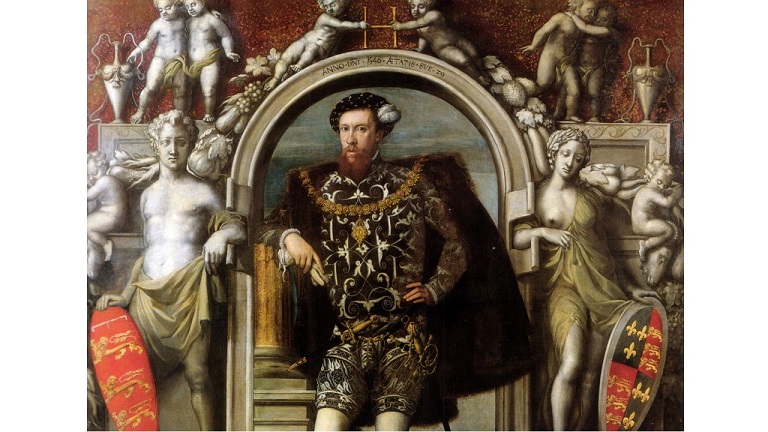.
The Forgotten Earl
He thought about the sonnets that he wrote;
The time he spent composing metered lines
Of rhyme, divided into quatrains. He
Alone devised the scheme;—but Virgil’s books!
If only there was time to translate more
Than two from The Aeneid epic poem;
A masterpiece about a hero called
Aeneas who survives the fall of Troy,
And after wand’rings, reaches early Rome.
The English-speaking world would have to wait
For future bards to puzzle out the ten
Remaining books; for Henry Howard, Earl
Of Surrey, sat inside a prison cell,
Condemned for quartering a coat of arms,
A treasonous act against his King, the Eighth;
But even as they led him to the block,
They couldn’t take away his claim to fame
As first to publish blank, pentameter verse!
.
.
Poet’s Note: Henry Howard was ordered beheaded in 1547 by King Henry VIII over a matter regarding the royal coat of arms. He and fellow poet Sir Thomas Wyatt are known as the “Fathers of the English sonnet.” Howard, however, was responsible for the rhyming meter and division into quatrains that characterize the form adopted by Shakespeare. He’s recognized as the first English poet to publish blank verse with his translations (published posthumously, 1554–1557) of books two and four of The Aeneid.
.
.
Cheryl Corey is a Connecticut poet. She is also an author of short stories, a novella, and recently completed a novel.















Fascinating story and connection to Shakespeare.
Thanks, Roy. I was inspired to write this poem after reading some back and forth commentary on this site regarding blank verse. I didn’t know anything about the man, so it was an educational experience for me as I conducted my research.
Thanks, Cheryl, it’s always good to remember Surrey. English poetry would have been different had he lived beyond the age of 30. I’ve studied all the lyrics he left us; his interest in rhyme and form is significant. As you say, he gave us the Shakespearean sonnet rhyme scheme (with some variants on it). The Scotsman Gavin Douglas translated the entire Aeneid before Surrey was born, but the Douglas translation is in Scots (like English but not English) rhymed couplets. I don’t recall whether I liked Surrey’s blank verse when I had to read a bit of it; do you have an opinion?
The little of his verse that I’ve read I find agreeable. You’re right. Who knows what he might have accomplished had he lived longer. He’s a study in dualities: prolific poet, but a man prone to reckless and rash behavior, so he was often his own worst enemy.
Hurrah for Henry Howard, he’s the man,
Although his life was such a little span.
Thanks for the educative and eloquent poem and for getting us to remember the Forgotten Earl.
I love your impromptu couplet, Paul. I decided on the title because no one’s writing blank verse thinking, “Oh, yeah, Henry Howard”, so he’s forgotten in that sense.
You do occasionally see blank verse on this site, Cheryl. I’ll use it for monologues, ending with a couplet, as I believe Shakespeare sometimes did.
The fact that he was executed simply for changing his coat of arms shows how utterly fragile was the Tudor claim to the English throne. Henry VII and VIII killed every legitimate Plantagenet whom they could locate, and anyone else with some color of a claim.
Evidently Henry VIII was totally paranoid, and Henry Howard’s father only escaped execution when Henry VIII died.
Cheryl, a thought-provoking read. I’m reminded of the saying that trailblazers never have the benefit of the trail. Without Howard, how could we have had Shakespeare as we know him? I hope your poem inspires others to visit or revisit the work of this unjustly neglected poet. Well done!
Thank you for your kind comments, Carey.
Long live the memory of Henry Howard, Earl of Surrey! I personally like his poem, “The Things That Cause a Quiet Life.”
I went and read the poem you mention. Two lines jump out at me: “The fruitful ground; the quiet mind” and “Without disease the healthy life”,
Excellent Cheryl, great to recall these early heroes of ‘modern’ English verse. Sir Thomas Wyatt was another. I have just come back from a vacation in which I visited Penshurst – the famous family seat of Sir Philip Sidney (and also the subject of the wonderful Ben Jonson poem) – the gardens still have that Renaissance structure to them – civilising, peaceful, and man working with nature in beautiful harmony. Its current lord, De Lisle, is descended from the Sidney line now for some 400+ years: good job they didn’t fall foul of the Tudors!